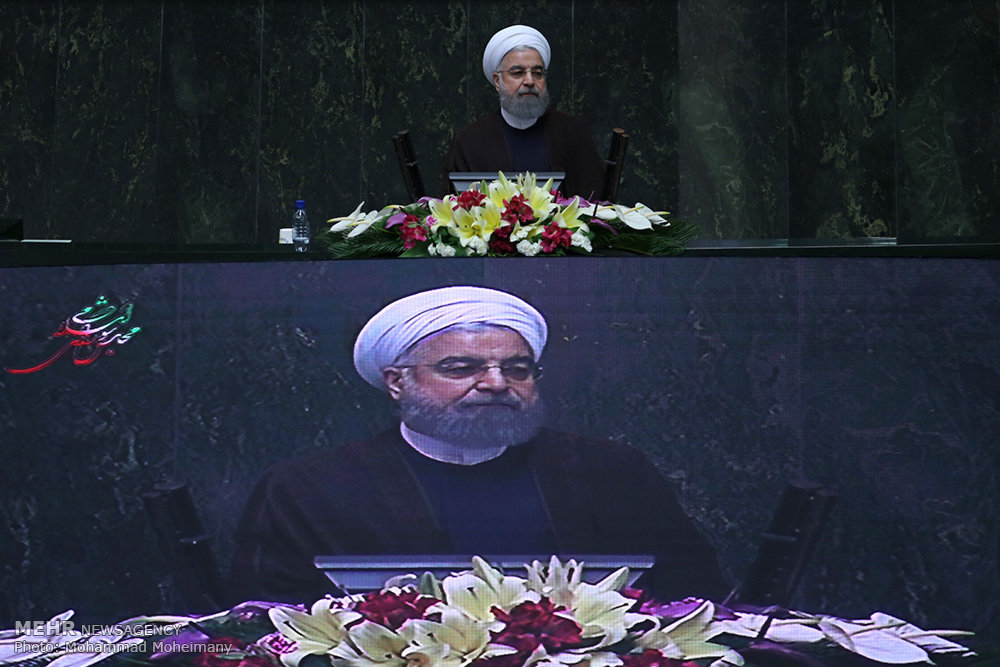London– The Joint Comprehensive Plan of Action (JCPOA) was the focus point of Iranian President Hassan Rouhani’s speech before the Iranian parliament as he threatened to withdraw from the agreement if the US administration continued to impose sanctions on Tehran. At the same time, he reiterated the importance of the nuclear deal in enhancing both the foreign and domestic situations.
A week after announcing his list of suggested ministers, the Iranian Parliament started on Tuesday morning a series of sessions to weigh the credential of Rouhani’s choices for the vote of confidence.
Rouhani addressed the parliament and explained in a lengthy speech the government’s program for the upcoming four years. He also defended his choices of ministers and the new cabinet formation.
Eight hours after ongoing debate between members of parliament and suggested cabinet, the confidence vote’s session was postponed to be adjourned on Wednesday.
During his speech, Rouhani said that it’s now clear under the presidency of Donald Trump, US was showing the world or even its allies that it is not a good partner and a trustworthy negotiation party.
He went on to say that Iran has lived up to its commitments and will monitor any violation by other sides of the agreement.
Criticizing Trump’s threats, Rouhani said: “Those who are trying to return back to the language of sanction and threatening, are imprisoned in their own past illusions and are depriving themselves of the benefits of peace by making up enemies and promoting fear.”
He also said: “Those who have been speaking about tearing up the JCPOA in recent months are accusing Iran of violating the spirit of the agreement.”
The President stated that the last 7 reports issued by the International Atomic Energy Agency (IAEA) have verified that Iran has been completely working within the JCPOA.
Iran’s president waived the possibility of withdrawing from the agreement “if America wants to go back to the experience (of imposing sanctions),” declaring that Iran would certainly return in a short time, not a week or a month but within hours, to conditions more advanced than before the start of negotiations.
This is the first time Rouhani suggests withdrawing from the JCPOA, especially after he said last week that Iran won’t be the first to withdraw the deal.
Iranian Foreign Minister Mohammed Javad Zarif, however, mentioned last month few options which Iran is suggesting in case of imposed sanctions, including the choice to withdrawal.
US President Donald Trump has repeatedly threatened to pull out of the nuclear agreement, and after a missile test at the end of January his administration declared that the US would no longer turn “a blind eye to Iran’s hostile and belligerent actions”.
Also, last week, Trump stated that Iran is not committed to the spirit of the agreement, days after US has lodged a complaint at the UN on behalf of UK, France and Germany following Iran’s successful missile launch test. The four countries considered Tehran to be in violation of the UN Resolution 2231 which requires Iran to stop any tests of missiles capable of carrying nuclear heads.
Over the past week, Iran had been under fire from conservative newspapers for not referring to the sanctions during his inauguration speech.
During his approval session for Rouhani’s second-term presidency, Iran’s Supreme Leader Ali Khamenei didn’t oppose the president’s aspirations for an active foreign policy, given that confronting the US administration is a priority of that policy.
Rouhani took a more balanced approach during the confidence vote session by confirming his country’s commitment to the deal, but at the same time threatening to withdraw.
He stressed that Iran wanted to abide by its commitments under the nuclear deal saying that JCPOA is the model for priority of peace and diplomacy over war and unilateralism. “Although this is what the Islamic Republic of Iran prefers, it will not be its only choice,” he stressed.
Rouhani also pointed out the impact of nuclear deal on Iran’s struggling economy, and promised a more targeted approach to social welfare and job creation, responding to attacks during the campaign that his agenda was mostly benefiting the rich.
He stated that the cabinet’s program was derived from his campaign program adding that Iran has been ruled by different presidents of distinct visions and affiliations.
He promised to eradicate absolute poverty and improve the conditions of the poorest “by five times” by the end of his term in 2021.
“The government is determined to carry out structural reforms. It sees the all-out fight against corruption as an absolute prerequisite for progress and social justice,” he said.
When introducing Minister of Economy and Finance Masoud Karbasian, President Rouhani called on the minister to prioritize combating money laundering, reforming banking system, organizing taxing system, and improving insurance industry. He asked the minister to prepare the country to adapt to a $50 billion budget of selling oil.
Rouhani stated that the country’s biggest challenge lies in an unbalanced budget, pointing out that his government failed to reduce its expenses after oil prices’ reduction.
The president also denied rumors that Iran’s Supreme Leader overlooked the suggested ministers’ list. Khamenei’s office issued a statement addressing the issue in which it said that the Supreme Leader only consults the President on three ministries: intelligence, defense and foreign.
In the speech Rouhani said that he wished to have three female ministers in the cabinet, but this is how it turned out to be.
Following the presidential speech, ten MPs, five proponents and five opponents, took the podium to speak for or against the ministerial nominees and the president’s plans.
